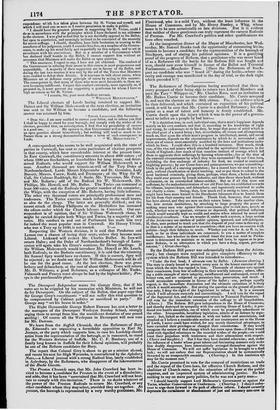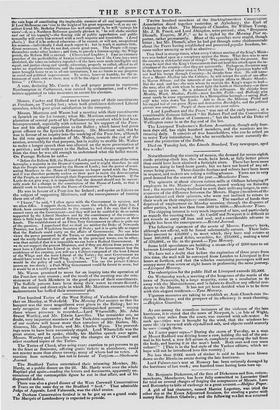The Reformers of Northampton having ascertained that there is every
prospect of their being tilde to return two Liberal Members and oust the Tory " Whipper-in," Mr. Charles Ross, sent an invitation to Mr. Raikes Currie to become their candidate. Mr. Currie accepted
it, and met the electors on the 30th ultimo. the address which,,,d
he then delivered, and which contained an exposition of his political creed, it will be seen that Mr. Currie is a decided Reformer ; his cha- racter as a man of talent and honesty is firmly established. Mr. Currie dwelt upon the injury which it was in the power of a govern- ment to inflict on a people by bad laws-
" It is doubtless true, in each individual case, that a man's happiness depends mainly on his own conduct, and that if, according to his knowledge of right and wrong, he endeavours to do his duty, he reaps that peace of mind which is
the chief good of a moral being ; but, nevertheless, all reason and all experience teach us, that upon the whole man's progress in intellectual, moral, and social improvement, depends on the circumstances by which he is surrounded ; and these are of course most essentially modified by the laws and institutions under which he lives. I could show this in a hundred instances. How much, think you, of the vice and misery which attached to the agricultural labourers in the
South of England—how much of that senseless instinct of revenge which led them to aggravate their sufferings by burning wheat-ricks—lies at the door of the external circumstances by which they were surrounded? By our Corn. laws,
forbidding the free exchange of industry for food, we created or continued blighting poverty; by our Game-laws and game-preserves, we put a stumbling-
block in the path of a starving population ; for a snared hare we send men to a gaol, without classification or moral teaching, and so put them to school to the most hardened criminals, giving them, perhaps, when there, a better diet than
they could ever procure by honest industry, and then throw them back, without a character, on an overstocked labour-market. But as if all this were not sufficient, by the maleadministration of our old Poor-law, we established rewards for idleness, improvidence, and debauchery, and ingeniously contrived to make
our charity a curse. Seeing, then, how much evil is owing to laws, surely we might have been more lenient to the Dorchester labourers than to banish them
for life from their country and friends. Thank God, however, that sentence has been altered, and they are now on their return home. Take another class. See how certain institutions, by attaching to large property the power of making many men vote against their consciences, give to rich men, merely as rich, whether wise or ignorant, virtuous or depraved, that political influence which would naturally wait on wealth and station when adorned by moral and intellectual excellence. Can we wonder if, under such a system, a large section
of the Aristocracy are careless of public opinion, ignorant, and self-indulgent. If, then, men pretend to teach you that the disposal of your votes in this way or in that is a matter of no moment to yourselves—that you have no concern with
politics—laugh their fallacies to scorn. Whether you vote for A. or B. is, in- deed, as far as those individuals are concerned, to you a matter of complete
indifference ; but whether in these critical times the man you send to Parlia- ment is determined to maintain or to remove bad laws, to oppose or to pro- mote Reform, is an alternative in which you have a deep, urgent, personal interest." ( Great cheering).
By the Reform Bill power was substantially taken from the Aristo- cracy; but changes were required to give complete efficiency to the system which the Reform Bill was intended to introduce-
" Under the first head, I advocate vote by Ballot. (Immense cheering.) The state is clearly bound to protect every man in the honest exercise of that
trust which the state has reposed in him. Thousands of electors vote against their consciences, from fear of suffering in their worldly interests ; others, offer- ing a noble example of stern integrity, uninfluenced and undismayed, record an honest vote, and are subjected to pecuniary loss, persecution, and insult. I could accumulate arguments in favour of the ballot ; one, perhaps equally cogent, is the immediate diminution and the ultimate extinction of bribery which it would accomplish. But resting the question on the ground of protec- tion only, I deny the right of the Legislature to refuse it. It is a measure which I will advocate earnestly and unremittingly. I will vote for the repeal of the Septennial Act, and the consequent return to Triennial Parliaments. I
will vote for the immediate extension of the suffrage to all householders. (Cheers.) The Reform Bill gave independence to the House of Commons,
and thereby destroyed its sympathy with the existing House of Lords ; it pro- duced two hostile assemblies, one of which must be practically subordinate to the other. Irresponsible, hereditary legislation, admits of no defence by argu- ment; but, linked as the institution is with our habits and associations, and attached as I believe a considerable section of our countrymen are to the House of Lords, I never could have wished, for any merely theoretical advantages, to have curtailed their privileges or changed their constitution. If they would recognize the nature of that change which has come upon them—if they would yield with dignified reluctance to the recorded wishes of the people—we would treat their prejudices with tenderness and their admonitions with respect.
(Cheers and laughter.) But I fear they have decided otherwise; and, under the influence of a leader whose great talents and fascinating manners only make him doubly dangerous, have ostentatiously arranged themselves against the House of Commons. We will not suffer legislation to be brought to a dead lock ; we will not endure that our Representatives should be systematically thwarted by an irresponsible assembly. (Cheering.) In this resolution 'Lee may for the moment rest."
Mr. Currie promised to vote for the removal of restrictions on trade and the repeal of the Corn-laws, for effective Church Reform, and the
abolition of Church-rates, for the education of the poor at the public expense, and an improved system of administering justice. He had nothing to say on mere party politics, for he was not a party man-
" I should heartily support Lord Melbourne's Government as against the Tories, whether Conservatives or Conformers. ( Cheering. ) I should endea- vour to urge them forward in the path of effective reform. I should earnestly deprecate the curtailment or abandonment of just and necessary mealares in the vain hope of conciliating the implacable enemies of all real improvement. If Lord Melbourne can rise to the height of his great argument '—if, as my ex- cellent friend Mr. Berkeley Portman has well expressed it, he will enlarge his views'—if, as a Northern Reformer quaintly phrases it, he will shake another reef out of his topsails;'—the flowing tide of public approbation and public sympathy will carry him onward with a swell majestic and irresistible. (Loud cheers.) But if it be ordered otherwise—if he cannot, or will not, comprehend his mission—individually I shall much regret it ; but in truth it matters little. Great occasions, if they do not find, create great men. The People Hill range themselves under other leaders ; and then, to parody a famous saying, the Whigs perish, the Reform Bill is eternal. ( Cheers and laughter.) I am no visionary preacher of the perfectibility of human institutions; but if the Corn-laws were abolished, the taxes on industry repealed—if the laws were made intelligible and equal, and justice cheap and speedy, education, properly so called, offered to all under no repulsive conditions, and the ennobling consciousness of self-govern- ment brought home to us in all our institutions, I see na limits to our progress in social and political improvement. To strive, however humbly, for the at- tainment of such ends as these, may well be the object of an honest man's am- bition." ( Cheers. )
A vote, declaring Mr. Currie a fit and proper person to represent Northampton in Parliament, was carried by acclamation ; and a Com-
mittee appointed to take measures to secure his election. .1.



























 Previous page
Previous page